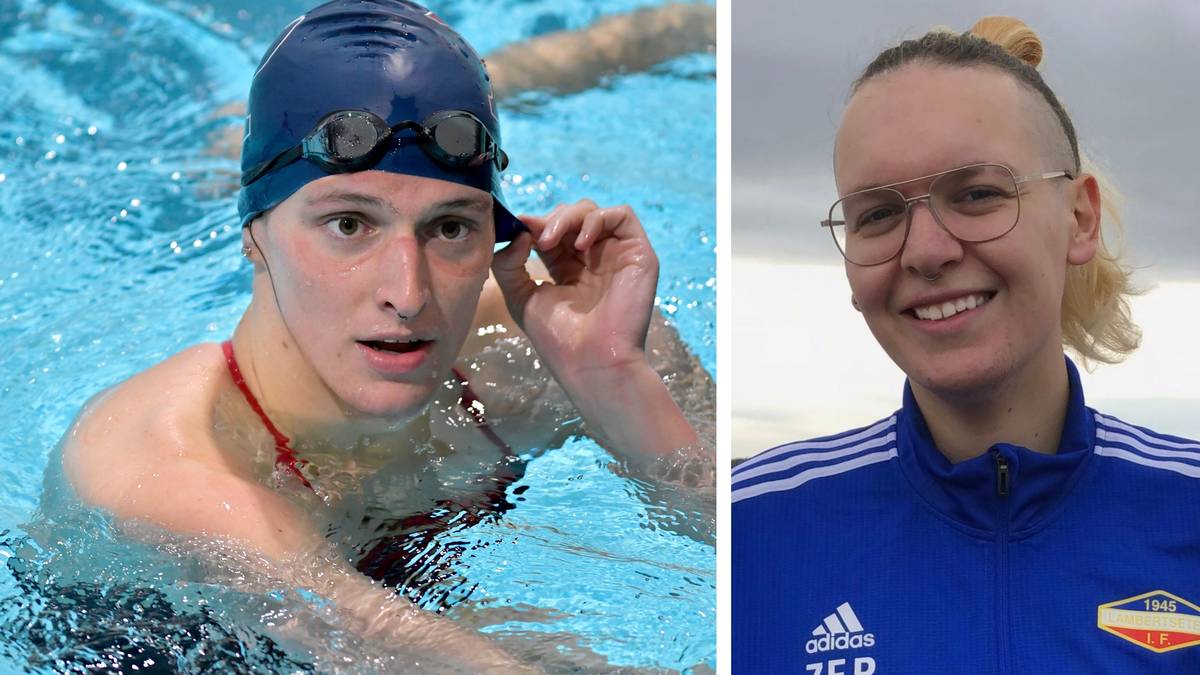The International Swimming Federation (FINA) recently ruled that trans women may not participate in elite events as women if they are over the age of twelve when they undergo gender confirmation treatment.
Several other associations have also recently tightened their rules.
– I feel very sad. If all these rules were here when I was young, it would be really hard for me. I use sport to express myself and it helps me understand who I am, said Perry, who is from England.
– Deprived of that opportunity for millions of trans people – it’s really sad. I’m thinking of all those affected by this, and I hope they have a good support system around them.
Perry now plays for team Lambertseter in the 3rd and 4th divisions, and refuses that she should have a physical advantage over other people because she is a trans woman.
– If it’s such a physical advantage, why am I not in Kristiansand playing for the Vipers, he asked rhetorically.
Goalkeeper Lambertseter hopes new rules in top-flight sport don’t turn young people away from their local sports team.
– I hope they take the opportunity to make new friends. Exercising can do wonders for your mental health.
– To exclude them from this is madness, he said.
Zooey Perry is the handball goalkeeper for team Lambertseter.
Private photo
Fear of negative comments
This is a special international confederation that adopts changes to the rules.
Håvard B. Øvregård, who is a senior advisor and works on work values at the Norwegian Sports Confederation, says they are getting more and more questions from trans people, parents and managers on sports teams wanting advice.
– There may be people who wonder if they can participate in sports at all, many fear negative comments or harassment. Some people have practical questions about how to organize when it comes to wardrobe, he says.
He reminded that transgender participation in sports is mainly grassroots sports and not elite sports.
– We are concerned that it should be possible to have some rules for top sports, which set limits for participation in women’s classes, while being open in general sports and allowing everyone to participate, said Øvregård.
– Now we can look ahead
So far, the change in sport has been received with joy and fury.
One that naturally reacted negatively was American Lia Thomas. There was a terrible and ugly debate in the United States about transgender people in sports when he was won the American College Swim Championship in the women’s division.
From now on, she and other trans women will be barred from taking women’s swimming classes.
– Fina’s decision is very disappointing. It is discriminatory and will only harm all women, he said.
Meanwhile, five-time world swimming champion Emily Seebohm from Australia was pleased with Fina’s decision.
– Now we can look ahead. We can all return to the sport we love and be confident that we are getting into healthy competition, he said, according to Reuters.

Transgender Laurel Hubbard received a lot of attention while participating in the Olympics.
Photo: Adrian Dennis/AFP
The decision came shortly after the International Cycling Union (UCI) decided to do so tightened their rules in the area. Starting July 1, trans women in elite races must demonstrate testosterone levels below the association’s permitted limit for the 24 months prior to competition. Previously, this period was 12 months.
NRK has before
written about British Emily Bridges
that have been affected by changes to association rules.
The International Rugby League (IRL) has also announced that trans women will be barred from participating in international rugby league until further notice, writes Security.
As such, the IRL has made the same decision as World Rugby, which has been banned.
Sebastian Coe, president of the International Association of Athletics Federations, also said that there could be changes in athletics.
On Monday, FIFA also stated that they were reviewing their regulations.
Also read:
Germany with new rules: Trans people can freely choose a team – NRK Sport – Sports news, results and broadcast schedule

Sports commentator at NRK, Jan P. Saltvedt.
Photo: ALEM ZEBIZ/NRK
I think more associations will follow
NRK sports commentator Jan P. Saltvedt believes that several confederations will follow in the future.
– There is a strong movement internationally to try to come up with something reminiscent of setting limits and, at best, clarification in some sports, he said.
– What we are seeing now, however, is a growing number of unions taking a more categorical line than we have seen before. In other words, in a form that in practice is a categorical prohibition against trans women from being able to compete in the women’s class.
– Fina’s rule that everyone who has undergone gender confirmation treatment after the age of 12 must be excluded from the women’s class is one example. This creates a more ethical dilemma, where no one can dispute the fact that this is a serious restriction on transgender’s right to participate in sport like everyone else. And this is deeply problematic, from a human rights perspective, he commented.
– Difficult considerations to combine
So why is this happening now?
IOC new guidelines or frameworks have left it up to the specialized associations themselves to draw up their own guidelines in relation to transgender people.
That doesn’t necessarily ease specific associations.
This recent change replaces the previous regulation which was based on testosterone values.
The main points in this framework are inclusion, fairness and no discrimination. It must also be a knowledge-based approach, as stated in the docs.

Håvard B. Øvregård is a senior adviser and works value in work at the Norwegian Confederation of Sport.
Photo: KETIL KERN/NRK
And this is what the International Swimming Federation is trying to follow.
– These are difficult considerations to combine, says Håvard B. Øvregård.
– One of the problems is that this is an area where knowledge is limited. There is also disagreement about what constitutes current knowledge.
– It becomes easy to prioritize one review at the expense of others, even though this is the opposite of messaging in the framework. Now we see that international federations have relatively different rules and I think it will be a long time before there is more harmonization across sports, he commented.
Saltvedt believes it will be an addition interesting to follow the line of FIFA further.
– The world’s biggest sport has by far been one of the most tolerant and inclusive of trans people and has yet to indicate that anything will change along those lines.

“Amateur analyst. Zombie geek. Hardcore troublemaker. Internet expert. Incurable twitter fanatic.”






/origin-imgresizer.eurosport.com/2024/07/19/image-81ba7137-ae78-47b8-828f-3ab476be8434-85-2560-1440.jpeg)